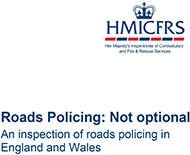7/21/2020
UK Government Report Undermines Speed Camera RationaleUK government investigation concludes speed cameras fail to improve safety while local officials rely on them to generate revenue.

A UK government report openly questioned whether local authorities are using speed cameras as a cash cow. Her Majesty's Inspectorate of Constabulary and Fire and Rescue Services (HMICFRS) last week released the results of a thorough investigation of the way roads were being policed in England and Wales. The goal was to identify areas where local and national strategies could be improved for the benefit of road safety. Road safety, however, is not the only motivation at work in the policing of the roads, as the number of automated tickets has grown by 41 percent in the last seven years.
"The majority of this increase is accounted for by the use of speed enforcement cameras," the report noted. "Some question the effectiveness of using such cameras and suspect that they are used as a source of revenue by police. "The reality is that use of cameras is effective in reducing serious collisions."
The report noted that despite the massive rise in speed camera tickets, there was no reduction in the number of collisions in which "speeding" was cited as a contributing factor (read more about contributory factors). Nonetheless, speeding is the sole focus of the speed camera partnerships that operate the cameras.
"In some cases, the police involvement in the use of cameras is limited to the administrative resources that support the processing of fixed penalties or the offer of speed awareness courses," the report explained.
The investigation found the speed camera partnerships were not interested in using education to deter unsafe driving.
"This apparent unwillingness to support education over enforcement had led to suspicion among officers, including some at chief officer level, that the focus of activity was intended to increase revenue for the safety partnership," the report stated. "In support of this, they gave examples of some camera sites that they believed didn't have a history of collisions or other identified vulnerabilities. Elsewhere, we were told that the reason enforcement took place at certain locations was that they were 'good hunting grounds,' rather than because they had a history of collisions."
The report even found that there was the "potential in some cases for revenue to be generated" from the speed awareness education courses that speed camera ticket recipients can take to avoid a hit to their insurance premium. The surplus revenue from the program goes back to the police. In addition, the courses are run by former police officers, particularly former chief constable Meredydd Hughes who was notorious for advocating the placement of a speed camera "every 400 yards on the motorway."
The report recommended that financial data from the speed awareness courses be published annually. The Alliance of British Drivers went a step further and called for the creation of a new agency dedicated to road safety without financial conflicts of interest.
"The fundamental problem with the current system is that no one is regulating enforcement operations; which have been subverted into a giant revenue-generating Wurlitzer for camera partnerships, awareness course providers and councils," the group explained. "What is actually needed is for speed limits to exclusively be set using the 85th percentile principle. To effect this we need the creation of an independent and objective Road Accident Investigation and Prevention body, composed exclusively of ex-marine and ex-aviation accident investigation personnel. This body would be tasked with investigating and determining the primary causes of road accidents, and how these can best be addressed to prevent and reduce their future incidence."
A copy of the report is available in an 800k PDF file at the source link below.


